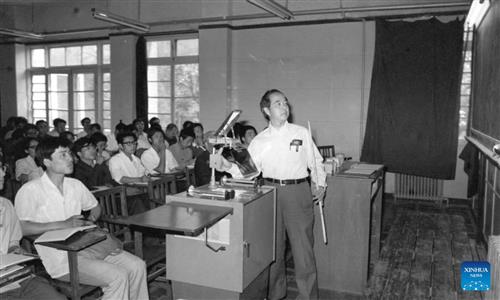Dr Tsung-Dao Lee’s vision on China’s science future still relevant

Illustration: Liu Xidan/GT
Dr Tsung-Dao Lee, a Chinese-American physicist and Nobel laureate, passed away in San Francisco on August 4 at the age of 97.
Dr Lee held many titles, including Chinese-American physicist, foreign member of the Chinese Academy of Sciences and honorary professor at Shanghai Jiao Tong University.
However, what makes him most fondly remembered by the global Chinese community is his joint Nobel Prize in Physics win in 1957 with Chen-Ning Yang, marking the first appearance of Chinese names on the Nobel Prize list.
In 1991, I had the opportunity to interview Dr Lee in Stockholm and asked him about China's scientific and technological development. Revisiting my notes from that interview, I am once again struck by his insight.
Over the past 40 years, China has developed from a poor country into the world's second-largest economy, making significant strides in high technology. This transformation underscores the intrinsic logic of China's rise.
However, more than 40 years ago, not many people believed in the potential of China's scientific research development, but Dr Lee was one of the few who did.
What is the future of China's scientific development? Can it withstand the strategic pressure from Washington? How can it break through under such pressure? Dr Lee answered these questions over three decades ago.
In the winter of 1991, Dr Lee was invited to Sweden to attend the 90th anniversary of the Nobel Prize. During his meeting with then Chinese ambassador to Sweden, Tang Longbin, I interviewed him with Wu Ping, a reporter from the Xinhua News Agency.
Reflecting on that interview, his straightforward assertion impressed me the most: China's scientific development should follow a path suited to its national conditions. He believed this path included strong government support, clear goals, concentrated use of limited resources, and bold adoption of advanced global technologies.
He viewed this as a shortcut for China to excel in science and technology. He compared it to the country's strategic emphasis on sports, such as table tennis, for overall success - from small victories to significant achievements. Rather than spreading resources thin across various projects, he argued for a focused and prioritized approach, which he deemed crucial for succeeding in international competitions.
According to Dr Lee, a critical method for China's technological advancement was to focus its limited financial resources on nurturing talented elite labor.
Looking back over the past 40 years, China's scientific and technological development has largely followed the path Dr Lee described. Furthermore, the future course of China's technological development will likely stay on the same trajectory.
Washington can see the strength of China's technological progress. This is why the focus of the US strategy toward China is to contain China's development in high-end technology.
China's scientific and technological development is not aimed at surpassing or defeating the US. However, as the only global hegemony, the US sees China as a strategic rival, and possibly an enemy. Therefore, the big game around high technology will continue for quite a long time.
Washington's worry and fear indicate that China has made the right choice: selecting a scientific and technological development path that aligns with Chinese realities.
In that interview, Dr Lee emphasized repeatedly that global scientific competition would become increasingly intense. Despite the immense competitive pressure facing China's technological development, he saw great potential in China.
It is precisely because Dr Li saw this potential, especially the potential of talent, that he made significant contributions to unleashing such potential.
Since 1972, he often returned to China to give lectures and suggestions. After the reform and opening-up, he spared no effort in promoting the advancement of China's scientific education. He made unparalleled contributions to the strategic layout of China's science education, frontier exploration of high-energy physics, training of high-level talents and international exchanges and cooperation.
Dr Lee also specifically mentioned that some young Chinese have an inferiority complex that needs to be changed. "China has already taken the lead in certain fields. Chinese people are brilliant. There are talented Chinese people worldwide; the domestic talent pool is rich. In the face of international competition, Chinese people should enhance their self-esteem and self-reliance and move forward steadily and gradually. I believe China can achieve victory."
Dr Lee's words still ring in my ears.
The author is a senior editor with People's Daily, and currently a senior fellow with the Chongyang Institute for Financial Studies at Renmin University of China. dinggang@globaltimes.com.cn. Follow him on Twitter @dinggangchina


